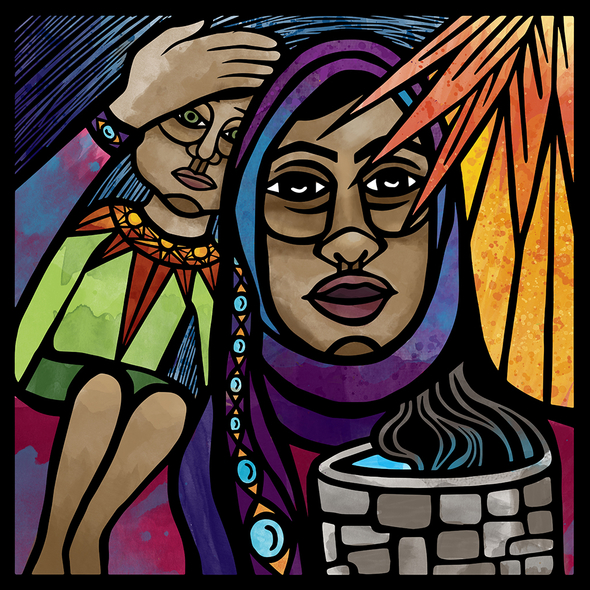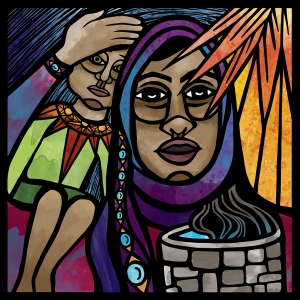Faith & Giving
I'm excited to share updates on the Executive Certificate in Religious Fundraising course and invite you to join our FBCH community in making a meaningful impact through generosity.
Read More

Clear Vision
Graphic Image
By Lauren Wright Pittman
Inspired by Genesis 21:8-21
Used with permission
© A Sanctified Art (sanctifiedart.org)
Visio Divina, latin for “divine seeing,” is a method of meditation, reflection, and prayer through a process of intentional seeing. Visio Divina extends the 6th century Benedictine practice of Lectio Divina, latin for “divine reading,” by the use of visual imagery.
Steps for Viso Divina:
Centre yourself by taking a deep breath and relaxing your body as best you can. Allow your shoulders to lower away from your ears. Let your arms rest in your lap and let your feet be fully supported by the floor. Feel the weight of your body held by the chair. Spend this time in quiet. Open yourself up to God’s voice.
(pause)
Take a deep breath in and out. Continue breathing deeply as you read the image. In this moment, simply notice the visual qualities of what you see: colours, line, shape, form, space, and texture.
(pause)
Now, take a deeper look. What parts of the image are your eyes most drawn to? What parts of the image did you quickly brush by or overlook?
(pause)
And now, use your imagination:
Imagine yourself in this piece. Where would you be and how would you interact with what surrounds you?
Look at the figure(s). What story do you assign to each of them? What emotions would you give to them?
Finally, observe your own emotions. How does this image make you feel?

Artist Statement
Hagar has every reason to feel God has abandoned her, but she still cries out in the wilderness and asks God to not let her look on the death of her child. She’s not asking for much. All she asks is for God to hold back tragedy from her.
God opens her eyes and she finds a well of water and nurtures her son. She nourishes a great nation. She carries the weight of a nation on her shoulders. For me, Hagar is an icon of strength and sustenance in those dry desert places. She is a well for her son and for many. In the image her hair waves and becomes the water that keeps her and Ishmael alive.
Her eyes are saturated and full, holding the grace that God so freely offered her, the grace that humanity withheld from her. The pattern of her garments echo her clear vision, and the many people of the great nation she holds shimmer around Ishmael’s face like countless stars in the sky.
Further Reflection by Rusty
I chose this image for our reflection this October as it captured many of the stories we will hear in Sunday worship. We began October with a reflection on the Hebrew midwives, Shiphrah and Puah (Exodus 1:8-22) who defied Pharaoh’s orders to kill baby boys and thus lit the way to the great exodus story. On October 11, we hear the prayers of Hannah who longs for a son and gives birth to the great prophet, Samuel (1 Samuel 1-2). On October 18, we meet a widow in a time of desperation, so hungry she is afraid she and her son will soon die and yet she offers hospitality to Elijah (1 Kings 17:1-24). Finally, as we hear again the story of Jonah–I think of all the women and innocent people of Nineveh. Jonah had written them all off as enemies. But surely we must remember in every state, that common people are often victimized by those in power and turned into enemies when all the long for is peace and the ability to nurture their families and loved ones.
The graphic image, Clear Vision, was inspired by the story of Hagar. She was an Egyptian slave of Sarah who was discarded by Abraham in an attempt to keep family peace. When Hagar fled into the wilderness with her son, Ishmael (his name means God hears), she encountered God. In that encounter, Hagar become the first person in the Bible to give God a name! She names God, El Roi (the God who sees). God also makes a covenant with Hagar, much like the covenant God makes with Abraham. Hagar will also be the mother of a great family with descendants so numerous they cannot be counted. Isn’t that AMAZING. A slave-woman, disagreed by the progenitors of our faith family is the one who first names God and God makes a covenant with her! (Genesis 16)
It is important that we see and hear the stories of these women, for they point the way to the God we know in Jesus. God sees and hears all the people of the world, especially those suffering and too easily disregarded by global politics.